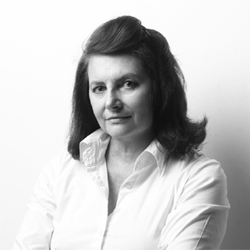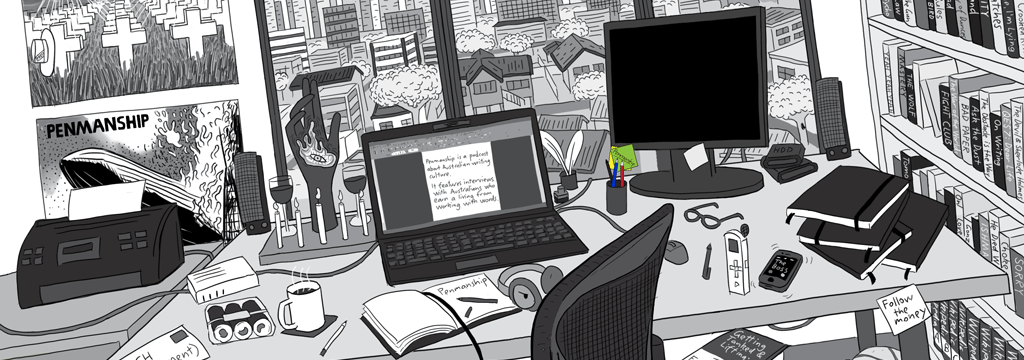Susan Johnson is an author and staff writer at Qweekend.
 Susan has recently published her eighth novel, The Landing, which takes its name from a fictional lakeside community north of the Queensland capital of Brisbane, where all of the 200 or so residents intimately know each others’ business. In addition to her prolific fiction work, Susan has published two non-fiction books, including a memoir, and also works as a staff writer at The Courier-Mail’s Saturday magazine, Qweekend. I’m more familiar with her fine work in the magazine, but when we met at the News Queensland offices in mid-September, we spoke largely about her fiction writing.
Susan has recently published her eighth novel, The Landing, which takes its name from a fictional lakeside community north of the Queensland capital of Brisbane, where all of the 200 or so residents intimately know each others’ business. In addition to her prolific fiction work, Susan has published two non-fiction books, including a memoir, and also works as a staff writer at The Courier-Mail’s Saturday magazine, Qweekend. I’m more familiar with her fine work in the magazine, but when we met at the News Queensland offices in mid-September, we spoke largely about her fiction writing.
Our conversation also touches on her experiences with the shrinking sizes of author advances in recent years; her early career as a cadet journalist at The Courier-Mail, and how she later found her way back to the newspaper where she began; the hostility that creative people and artists tend to be met with whenever the topic of writers’ grants are discussed in public; and how she wrote herself into existence with her first novel, after first meticulously deconstructing her favourite authors to better understand how they wrote.
Over the course of ten books and thirty years, Susan Johnson has been long-listed and short-listed for many national and international awards. Her first shortlist was for the 1991 Victorian Premier’s Literary Award (for Flying Lessons), followed by the 1994 National Book Council’s Banjo Award (A Big Life) and the National Biography Award 2000 (A Better Woman). The Broken Book was shortlisted for the 2005 Nita B Kibble Award; Commonwealth Writers’ Prize; the Westfield/Waverly Library Literary Award, and a slew of other awards, including a long-list for the Miles Franklin and the International Dublin IMPAC Award. Her last novel, My Hundred Lovers, was published in 2012 to critical acclaim. Susan is an Adjunct Professor in Creative Writing at the Queensland University of Technology, Brisbane. She currently lives in Brisbane, from ten years in London, France and Greece. She is a feature writer at Qweekend magazine, The Courier-Mail.
Susan Johnson on Twitter: @SJreaders
Direct download | iTunes | Stitcher | Libsyn | YouTube
Timeline:
3.00 Susan has taken some time off from Qweekend to promote The Landing in August and September 2015
4.00 “Anybody who’s a fiction writer is essentially an introvert. I’m very happy to spend a lot of time by myself”
6.30 “The blurb that I came up with for The Landing I think was actually wrong, as it doesn’t actually encompass all the other characters”
7.00 Susan took a public speaking course ahead of the publication of her first novel in her 20s
8.00 “I think this kind of ‘performing seal’ aspect of writing is a bit unfortunate”
9.30 Susan was born in Brisbane; her father was a journalist on The Telegraph, and was transferred to The Sun in Sydney when Susan was three months old; he later bought a pineapple farm in Nambour, so Susan returned to Queensland and went to Nambour High School
14.00 Susan is a firm believer in single-sex education for girls, which she experienced at Clayfield College in Brisbane for her final two years of high school
15.30 Susan studied journalism at the University of Queensland; she wrote short stories in her early 20s, and was trying to write a novel, but found it “very difficult”
17.00 Susan started her career in journalism at The Courier-Mail as a school-leaver cadet
18.00 Two of her early-career mentors included John Hay and David Rowbotham, from whom she learned how to think about “the link between feeling and thought”, though it wasn’t expressed in such terms
21.00 Susan was offered the job of Queensland editor at The National Times at age 24
21.30 “For me, journalism seemed to be the surface of things; fiction seemed to be the truth of things. I still argue that great fiction has more of a capacity to tell you more profound things about the world than great journalism”
23.00 Owing to her early experiences with mentorship, Susan has always been very conscious of mentoring and promoting the careers of younger fiction writers
24.30 Susan was one of the three original writers on Good Weekend, which was a Saturday section in The Sydney Morning Herald before it became a standalone magazine
26.30 “For women, there’s a hard choice to make. I think that having children does impede your career, no doubt. I had my children very late, at 38 and 40, and that was a big decision for me. I think it’s no accident that the majority of the world’s finest female writers have been childless”
28.00 Susan wanted to leave Queensland, which was under the conservative rule of Premier Joh Bjelke-Petersen, so she pitched herself to Ita Buttrose, then editor of The Australian Women’s Weekly, in 1978
30.00 “I’m quite hairy, and at the time I wasn’t shaving my legs. I got called into the chief-of-staff’s office, and asked to shave my legs, because I was representing the Women’s Weekly”
34.00 Susan didn’t have a lot of self-confidence as a young woman, and she says that by writing fiction, she wrote herself into existence
35.00 Susan had an acrimonious divorce from her husband, so her move back to journalism was because she could no longer support her children from novel writing
36.00 “My primary influence in Australia would have to be Helen Garner. I remember buying a hardback copy of Monkey Grip in 1977, reading that, and thinking, ‘God, this is my life'”
38.00 “I basically taught myself to write. I didn’t do any creative writing courses; what I did was, I took apart the mechanisms of books, as if they were clocks. I studied Monkey Grip, The Great Gatsby, and looked at – what was the vehicle? What were they doing? How did they actually work?”
39.30 Susan likes Norman Mailer’s analogy about “adding another brick to the wall of art; all you can do is work your little part, and I’m okay about that. I’ve got my own little territory, and I’ve just got to work that”
41.00 The story behind being offered her first book contract, for Messages From Chaos (1987), which was written with the assistance of an $8,000 Literature Board of the Australia Council grant
45.30 “I’ve had good luck in my career, but I’ve also had bad luck in that I’ve been shortlisted for every award going, but I’ve never won anything”
48.00 Holding her first published novel in her hand, at age 29, was “the sweetest moment of all; there’s nothing quite like that”
49.00 All of Susan’s books have been optioned for potential production as films or television series
50.30 Susan wrote her memoir, A Better Woman, for $6,000 in Australia in 2000, then sold it to Simon & Schuster in New York for USD$100,000
52.30 During her 20-year stint writing books, largely overseas, Susan would produce a novel around once every three years
54.30 While living in London, Susan could earn $10,000 for one piece of journalism by selling it to several different markets, which is almost impossible nowadays
55.00 “I used to get $80,000 an advance for my books, which sounds a lot, but if you divide it by three years, it’s not a huge amount of money. For advances in Australia now, you’re lucky to get more than $10,000”
58.30 How Susan structured her workdays while working on writing a novel; she prefers not to outline, so that the book is “an organic creation”
64.30 How Susan measured the success of a day while working on a book: “1,000 words a day, minimum”
68.00 “I’ve had to sacrifice an awful lot in order to be a writer. I don’t have as much money as my friends; I have less than $100,000 in superannuation”
69.30 Susan’s parents were both supportive of her career choice to be a novelist
71.00 “I still think, arguably, you’re treated with a bit of suspicion in Australia if you’re a writer; you’re still seen as a bit of a wanker”
72.00 When Susan returned to Brisbane in 2010, she became involved in the national dialogue around identity and the arts, and helped to set up the Queensland Literary Awards in response to Campbell Newman’s decision to axe the Queensland Premier’s Literary Awards
74.30 What Susan thinks can be done to combat the level of hostility toward writers and artists in Australia
79.00 The series of events that led Susan to return to Australia and seek work as a writer; “It was very humiliating; I had to write and ask everybody I’d ever known in my whole entire professional career – including people who had interviewed me – to see if I could get a job”
81.30 After about a year working for Education Queensland as a crisis manager on the media team, Matthew Condon became editor of Qweekend, so Susan immediately emailed asking him for a job
84.00 Susan feels that journalism helps her fiction, and vice versa
86.00 “Character is one of the great pools for me in journalism and in fiction; I think everything is character-based, and through character, you can tell the history of the world”
87.00 Where Susan thinks The Landing fits amongst the “wall of art” that she’s built so far, to use Norman Mailer’s turn of phrase
88.30 “Every next novel is going to be ‘the one’, so let’s see. I still want to write again”

